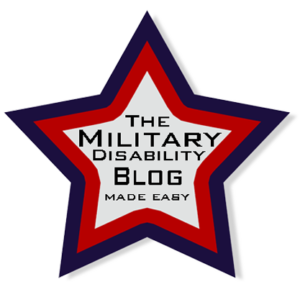On March 20, 2025, we will stop accepting new Military Disability Made Easy subscriptions. For more information about how this change may impact your subscription, click here
Military Disability Benefits for People with 20 or More Years on Active Duty
- Published:
- Last Updated: October 5, 2022

We’re touching on a confusing topic today: regular 20-year retirements with disability.
As you all know, 20 years in the military is the basic requirement for a full retirement from active duty. After 20 years, you can retire any time, and you’ll receive complete retirement benefits, including retirement pay, full medical care, commissary privileges, etc. All of these benefits are given by the DoD, not the VA. If you put in 20 years, you will get all this from the DoD no matter what.
So if you are a 20-year Retiree and have a disability, the DoD will give you a military disability rating, but it won’t affect your benefits at all. You won’t get any extra for this disability, since you are already receiving the full benefits from the DoD. So whether you get a 20% rating or a 90% rating from the DoD, nothing will change. The only real benefit you get from the DoD acknowledging that you have a disability is that the VA will not be able to doubt that your disability was caused by military service, and you’ll be able to get full VA disability benefits, no problem.
Now for VA disability benefits. The benefits you receive from the VA for a disability are not affected at all by how long you were in the military. It doesn’t matter. It is all based on the rating the VA gives your condition. So if someone was in the military for 5 years and was given a VA rating of 40%, and someone else was in the military for 25 years and was given a VA rating of 40%, they will both receive the same amount of benefits from the VA since both received a 40% rating.
That’s all pretty straightforward, but now I’m going to throw a wrench in the works. Whenever anyone is receiving both VA disability benefits and DoD retirement benefits (whether disability or not), the amount of the DoD benefits are decreased by the amount of the VA benefits. Basically, the government will not pay you twice, only once.
So, if Bob is receiving $1,000/month from the DoD, and then the VA begins giving him $500/month, the amount he gets from the DoD will be decreased to $500 ($1,000 – $500 = $500).
While this may seem unfair or just plain confusing, there is actually a huge benefit to this system: any money received from the DoD is taxable, while any money received from the VA is not. You still get the overall amount you deserve, but instead of all of it being taxable, only a portion is. And if the amount you receive from the VA is more than the amount you receive from the DoD, you will simply stop receiving any monetary benefits from the DoD (all the other benefits will remain the same), and you’ll only receive the larger amount from the VA, which is all not taxable. Sweet.
To sum up, you will receive full retirement benefits from the DoD if you retire after 20 or more years on active duty. Your DoD disability will not affect these benefits at all. You will also receive VA disability based on your disability rating, and that amount will be subtracted from the amount of retirement pay you are receiving from the DoD. And again, this is awesome since VA money is not taxable.
This system is only true for veterans with 20 or more years on active duty. The system works a bit differently for reservists with 20 or more years, and I’ll discuss this next week.
Recent Posts
TDRL vs. PDRL—Which is better for disability benefits?
February 13, 2025
Leukemias and Multiple Myelomas NOW on the Presumptive List
January 9, 2025
Two MORE Conditions added to the Burn Pit Presumptive List
January 3, 2025
The 2025 VA Disability Rates are here!
December 2, 2024
About Us










18 Comments
You need to mention Concurrent Receipt for 20 plus years and a rating of 50% or more.
Hi Greg –
Good point. There are two different types of concurrent receipt that are available to 20-year retirees. These options allow for you to receive both VA Disability and DoD Disability at the same time.
Concurrent Retirement and Disability Pay (CRDP – the one you're referring to) and Combat Related Special Compensation (CRSC).
We discuss both in detail on our site:
http://www.militarydisabilitymadeeasy.com/crdp.html
http://www.militarydisabilitymadeeasy.com/crsc.html
Dr. Johnson, I am currently on 100% disability but when granted my rating (Sept. 14) for a heart condition that was left off my original appeal. I was shorted my retro back pay by nearly 5 years and I am now in an effort to recoup the pay. My original appeal June 09 has not been addressed, I received 2 years back pay in Dec. 14. My question is how will the VA view my claim. I have four conditions that were ignored when I was compensated. The VA judge found for me. I am confused! I have proven I have diabetes, presumed from AO. My unpaid conditions (back pay) are Retinopathy, peripheral neuropathy and kidney failure. Can you give me an idea as to how the VA will see this? I am scheduled for exams this month. Thanks! G.B.
This can be a bit tricky.
Basically, the VA will only compensate you for conditions that you CLAIM – so conditions that you physically list on a VA Disability Claim form and submit. Just because you had a condition that qualifies doesn't mean you claimed it officially.
Now, you can always submit new claims for conditions that were not claimed previously, but this does not entitle you to full back pay.
You receive back pay for a condition only back to the date the original claim for that condition was received UNLESS you submit the claim within the first year after you separate from the military. Then you receive back pay to your date of separation.
So, if you have a condition that always qualified, but you didn't submit an official claim for it until 2 years after separation, then you do NOT receive back pay to the date of separation, only to the date you submitted your claim.
So, for your case I need to have a better understanding of the timeline in order to definitively say what back pay you qualify for.
When did you officially submit a claim for THIS heart condition? (not an appeal)
Did you officially include those additional four conditions on a claim? If so, the VA just ignored them when they issued your Rating Decision? They aren't addressed on the Rating Decision at all?
If I may I have a question. I received my first VA disability check on Dec 1st; I am retired AF; so my AF pay was reduced by the amount of my VA paycheck. Should I also be receiving back pay from the VA? I filed My claim in May 2018 and it was approved by VA in Oct 2018. Thank You
Sorry I forgot to mention I received a 30% disability rating
Having your AF pay reduced by your VA pay is standard. The only way to get both is to qualify for CRSC or CRDP.
http://www.militarydisabilitymadeeasy.com/crsc.html
http://www.militarydisabilitymadeeasy.com/crdp.html
As for backpay, you should be paid back to the first day of the month after you submitted your claim, so June 2018. This check can sometimes take a few more months to process than the regular payments. You can contact the VA directly to see if it was delayed or if they forgot it entirely. I wouldn't be too concerned until February, though.
Thank you for your feedback and info. I called the VA and they said I don't get backpay; unless I was 50% or more disabled; I told them that how come a veteran would get back pay and not a retiree; they didn't have an answer
What is the effective dates for your conditions listed on your VA Rating Decision?
You should be receiving pay back to the effective date, which should be the first day of the month after you submitted your claim. If they have a different effective date, try talking to them to figure out why they chose that effective date.
The effective date is 1 June. I received my first VA check 1 Dec; which is offset by my Air Force Retirement. The VA says since I get retired pay there is no backpay or retro pay; I told them I should at least get a statement from them saying that my pay is tax free dating back to 1 june 2018. No answer yet from them. I will wait until Mar to see if the backpay was caught up in accounting. The VA did mention the Air Force was doing an audit of my account; the audit started in Nov.
Your AF retirement should be offset by your VA comp, not the other way around. Unless you qualify for CRSC or CRDP, your DoD compensation decreases by your VA compensation amount.
Regardless of this, if the effective date is 1 June, then that is the first month you qualified for benefits. You should still be paid for June-Nov, and if it wasn't included in your first check, then it should hopefully still be coming.
Thank you very much. I will give it six months from when I received my first paycheck; to see if they include the money. So April is my target date.
I know veterans with VA rating of 100%, but they work? How does it works? I served 21 years and have 90%
Hi Dr. Johnson, I have a question. I am a Chapter 61 retiree with 20 years of service but I have a VA waiver reducing my retirement pay. Is there a way to lower the VA waiver?
You are correct that the ratings are intended to reflect that ability of the veteran to work, so things like the amputation of both feet is rated 100%, but in our tech-age, these veterans could easily still hold successful jobs. Not always does the rating equal unemployability, but it still should compensate for the daily restrictions/adjustments needed to function.
All VA money reduces retirement money unless you qualify for CRSC or CRDP.
http://www.militarydisabilitymadeeasy.com/crsc.html
Hello. I was rated 0% in 1982 for subsequent surgeries I had after a fall from a moving truck. The surgeries help out but they wanted to do more. I developed Meniere's syndrome and Sever Migraines with hearing loss left eye sight. I have no issues except I hade the hard copy for 1982 and the VA did not! I reapplied in November 2019. the VA granted a 150% rating but change my date for 1982 to 2019 should it not be 1982?. I say if a person has a disability say at 0 or 10% or whatever and as we age your disability can worsen. I was younger then but at 61 I will live the rest of my life with this. Thank you George
This is tricky. If the VA did not have the evidence they needed in 1982, then they technically made the correct decision at that time. If the first time they saw the hard copy of the records was in 2019, then that is the correct affective date since they did not make an error with the first decision. If you can prove that they did have the evidence and made an incorrect error at that time, then you have a case for getting 1982 as your effective date.